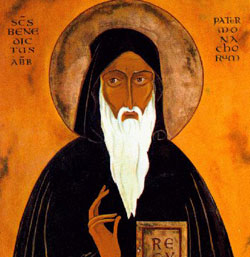Saint of the Day Online - St. Benedict of Nursia
Saint of the Day for Tuesday, July 11, 2017
11-07-2017
Saint Name: St. Benedict of Nursia
Place: Norcia, Umbria, Kingdom of Odoacer
Birth: 480
Death: 21 March, 543
Feast: July 11
St. Benedict of Nursia who was born on March 480 is a Christian saint, who is venerated in the Eastern Orthodox Churches, the Catholic Church the Oriental Orthodox Churches, the Anglican Communion and Old Catholic Churches. He is a patron saint of Europe.
He was repelled by the vices of the city and in about the year 500, fled to Enfide, thirty miles away. He decided to live the life of a hermit and settled at the mountainous Subiaco, where he lived in a cave for three years, fed by a monk named Romanus. Despite Benedict's desire for solitude, his holiness and austerities became known and he was asked to be their abbot by a community of monks at Vicovaro. He accepted, but when the monks resisted his strict rule and tried to poison him, he returned to Subiaco and became a center of spirituality and learning. He left suddenly, reportedly because of the efforts of a neighboring priest, Florentius, to undermine his work, and in about 525, settled at Monte Cassino.
Benedict's main achievement is his "Rule of Saint Benedict", containing precepts for his monks. It is heavily influenced by the writings of John Cassian, and shows a strong affinity with the Rule of the Master. But it also has a unique spirit of balance, moderation, and reasonableness, and this persuaded most religious communities founded throughout the Middle Ages to adopt it. As a result, his Rule became one of the most influential religious rules in Western Christendom. For this reason, Benedict is often called the founder of western monasticism.
Soon disciples again flocked to him as his reputation for holiness, wisdom, and miracles spread far and wide. He organized the monks into a single monastic community and wrote his famous Rule prescribing common sense, a life of moderate asceticism, prayer, study, and work, and community life under one superior. It stressed obedience, stability, zeal, and had the Divine Office as the center of monastic life; it was to affect spiritual and monastic life in the West for centuries to come. While ruling his monks (most of whom, including Benedict, were not ordained), he counseled rulers and Popes, ministered to the poor and destitute about him, and tried to repair the ravages of the Lombard Totila's invasion. He died at Monte Cassino on March 21 and was named patron protector of Europe by Pope Paul VI in 1964. His feast day is July 11.